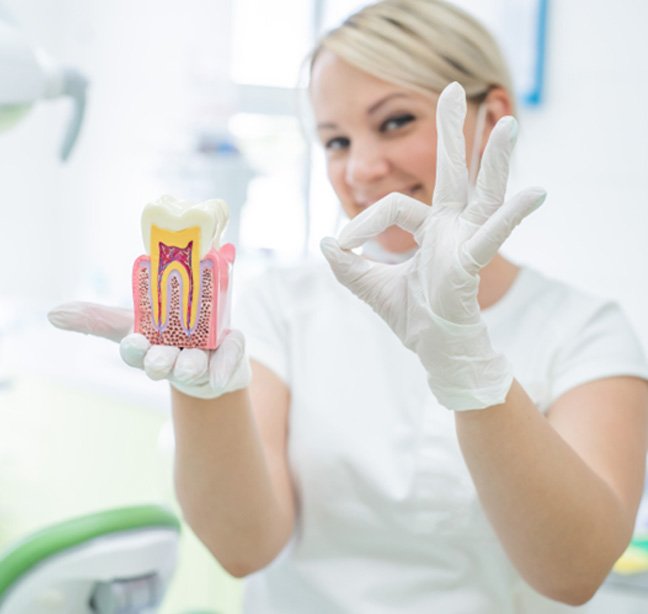Root Canal Treatment – Richardson, TX
Relieve Your Ache and Preserve Your Tooth
Do you have a consistent or worsening tingling or pain in one of your teeth? If so, there’s a chance that the tender roots and tissues inside have become infected. If the pulp has been affected by disease, the nerves can become painfully inflamed. You might assume it will eventually resolve itself, but this type of issue generally requires professional intervention.
Fortunately, Dr. Hsia can relieve your ache and preserve your tooth with a root canal procedure. Continue reading to learn more about this smile-saving treatment, and feel free to contact us for additional information.
Why Choose Jupiter Family Dental of Richardson for Root Canal Treatment?
- Sedation Available to Enhance Patient Comfort
- Advanced Technology for Accurate Results
- Resilient, Tooth-Colored Restorations to Protect Your Smile
Do I Need Root Canal Treatment?

A severe or persistent ache is one of the most common signs that you need a root canal. However, there are other potential indicators, such as:
- Sharp or piercing pain when you bite down.
- Persistent dental sensitivity, especially to overly hot or cold temperatures.
- Red or inflamed gums, or a small blister-like bump in the tissue.
- Discoloration around the troublesome tooth.
When it comes to your grin, no pain is considered normal so if you’re in any amount of discomfort, you should contact us to schedule an appointment as soon as possible.
The Root Canal Process

Although many patients avoid getting a root canal because they assume it will be a lengthy, agonizing procedure, this treatment usually alleviates more discomfort than it causes.
First, our team will numb the area with a topical anesthetic and/or sedate you to help you feel calm and relaxed the entire time. Then, Dr. Hsia will create a small opening in the affected tooth to clear out damaged materials. Next, he’ll sanitize the area to eliminate any remaining bacteria and seal your tooth to keep germs out.
The final step is providing a lifelike dental crown to restore your grin’s functionality and appearance. The dental lab can take a couple of weeks to create your finished prosthetic, so we’ll fit you with a temporary one to safeguard your smile in the meantime.
The Benefits of Getting a Root Canal

If you’re nervous about an upcoming root canal, understanding how it can help you might set your mind at ease. There are many advantages to getting this procedure in Richardson, including:
- Alleviates pain. Releasing the built-up pressure forming in an injured or diseased tooth is often the best way to provide some much-needed relief.
- Preserves dental health. This method can save your natural tooth in circumstances that might otherwise require an extraction, which comes with an additional risk of infection.
- Realistic restorations. Our team can provide a resilient prosthetic made from tooth-colored materials to cover the affected tooth so no one can tell there was ever an issue.
- Easy maintenance. Caring for your recently treated tooth is as simple as brushing and flossing twice daily and visiting us every six months for a routine checkup and cleaning.
Understanding the Cost of Root Canals

If you have an infected tooth, we may be able to save it with root canal treatment. However, you may be concerned about how much it will cost. During your visit with us, we will go over the financial aspects of your smile in detail so you will know exactly what you can expect. Until then, here are some things for you to take into consideration.
Factors That Can Affect Root Canal Cost

We can’t determine the exact cost of your root canal treatment until you see us in person. This is because multiple factors contribute. Here are some of the most prominent ones:
- Location: Depending on where your tooth is located, the cost can vary. Molars have more roots than teeth in the front of the mouth, so they tend to take longer to treat and cost more.
- Difficulty: The more complex a procedure it is, the longer it takes and the higher the cost.
- Additional Treatments: Sometimes, patients need to undergo another treatment, like getting a dental crown, in addition to their root canal. This will incur its own cost and must be considered.
Is It Cheaper to Pull My Tooth?

Many people are tempted to skip the root canal process and have their tooth extracted instead. However, this generally isn’t the best option. The cost of a tooth extraction may be less upfront, but you need to consider the long-term consequences of losing one of your natural teeth. After a tooth is extracted, your bite can become negatively impacted when the surrounding teeth shift around. This can cause difficult chewing and general discomfort. To prevent this, you would need to replace your missing tooth with a dental bridge or dental implant. The cost of these tooth replacement options can add up quickly. Ultimately, a root canal is the most cost-effective way to address an infected tooth in the long term. Remember that you shouldn’t put off a root canal either. If you wait too long, your tooth may no longer be salvageable.
Does Dental Insurance Cover Root Canal Treatment?

In most cases, root canal treatment is considered to be a “major restorative treatment.” Most dental insurance plans cover this tier of service at approximately 50%. Just keep in mind that every plan is different, so it’s best to check with your insurance provider so you don’t run into surprises. At Jupiter Family Dental of Richardson, we are in-network with multiple popular PPO dental insurance providers and happy to file claims on your behalf.
Other Options for Making Root Canal Treatment Affordable

If you don’t have dental insurance, this doesn’t mean that you are out of luck. In addition to welcoming dental insurance, we are happy to accept Medicaid and CHIP. We also accept payments through third-party financing companies, like CareCredit and Sunbit. This way, you can split the cost of your treatment into manageable monthly installments with little to no interest.
Root Canal FAQs
How Much Pain is Normal After a Root Canal?
While your root canal treatment itself should not hurt (Dr. Hsia will use local anesthesia), you should expect some discomfort and soreness for several days following the procedure.
After the numbness wears off, you may experience mild pain and sensitivity; however, this should only be temporary and can be alleviated with over-the-counter pain relievers like acetaminophen or ibuprofen.
Avoid chewing on anything hard or chewy during your recovery period, as doing so could worsen your discomfort.
Your pain should start to subside after about three days, but if it doesn’t, please call Dr. Hsia as soon as possible.
Can I Eat Before a Root Canal?
If you will be undergoing sedation for your root canal, you might be asked to fast for a few hours prior to your procedure. This is to reduce your risk of nausea from the sedative.
If you are not undergoing sedation, Dr. Hsia recommends you eat a healthy meal at least a couple of hours prior to the treatment but be sure to brush your teeth after. Your mouth will be numb following the procedure, so it will be difficult to eat.
Be sure to avoid alcohol for 24 hours prior to your procedure, as this could cause negative interactions with your local anesthetic.
Can I Take Antibiotics Instead of Getting a Root Canal?
While antibiotics can treat bacterial infections in nearly every other part of the body, they do not work on tooth infections. Antibiotics work by traveling through the bloodstream to target infected areas of the body, but the bloodstream cannot reach the pulp of your tooth. Thus, they can’t eliminate an infection there.
Should your tooth’s pulp become infected, the only option to treat it besides tooth extraction is a root canal.
Are Root Canals Safe During Pregnancy?
Both the American Dental Association and the American Congress of Obstetricians and Gynecologists agree that root canals can be performed safely during pregnancy. Modern techniques can now minimize the risk of harm to your developing fetus, and local anesthetics should pose no risk to your baby.
If possible, try to schedule your root canal during your second trimester, as the first trimester is often considered the riskiest, and you may feel uncomfortable laying back in the dentist’s chair during the third trimester.
While the American Pregnancy Association recommends reducing your exposure to medication as much as possible, it is also careful to note that when the mother is in pain, this places stress on the fetus. Thus, managing pain is very important during pregnancy.
Antibiotics may also be necessary to reduce the risk of infection to your baby. Dr. Hsia can discuss your medication options with you and help you determine the safest choice for you and your growing child.
Do I Still Need a Root Canal if My Toothache Went Away?
Yes! That answer may surprise you, but it’s because a toothache that suddenly disappears is often the result of the nerve dying. This signals that there is only a small window of time left where your tooth can be saved. Plus, there is potential for your surrounding teeth and gums to be negatively impacted as well. So, don’t postpone scheduling an appointment any longer; get the care you need ASAP.
Can Root Canals Be Prevented?
In most cases, root canals can be prevented with good dental care habits. A few examples include brushing and flossing consistently, wearing a mouthguard while playing sports, eating a healthy, well-balanced diet, and coming to our office every six months for a dental checkup and cleaning. The last part is particularly important because, if a small cavity or crack in your enamel does develop, we can detect and treat it right away, preventing the need for a root canal in the process.
Are Root Canals Painful?
This is hands down one of the most-asked questions about root canals, and we can honestly tell you the answer is “no.” This is largely because the first step of the entire treatment process is always the same: thoroughly numbing your mouth to ensure you don’t feel any discomfort or pain. Plus, this emergency dentistry service is designed to alleviate sensitivity, soreness, and other abnormal dental symptoms by eliminating the infection. So, you don’t have to worry – you’ll be able to relax comfortably in the treatment chair as we work to restore the look, health, and function of your tooth.
Do Root Canals Make You Sick?
Sometimes, the thing holding patients back from getting a root canal is a fear that the procedure will hurt. Other times, it’s something they’ve heard, like that it will make them sick. The truth is that root canal treatment doesn’t hurt and it won’t make you sick. The idea that this emergency dental treatment could lead to illness stems from poorly designed research conducted back in the 1920s. However, the claim has been debunked several times, and there currently isn’t any scientific evidence to support it. In other words, the answer is “no, getting a root canal will not make you sick.”
Remember, if you have any questions about your care or want to fact-check something you’ve heard about root canals, you can always give our Richardson dental team a call! We’d be happy to provide further insight, answer any questions you have, and help you decide what’s best for your unique dental needs.




